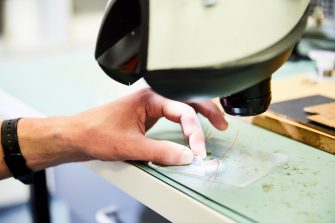Bioinformatics Engineering

What is Bioinformatics Engineering?
Bioinformatics combines computer science, big data and life science to provide better solutions to experts working with and managing huge volumes of genetic information. Gain the skills to design and implement software that can perform a range of health intelligence functions.
Why study Bioinformatics Engineering?
Do you have an interest in Computing and Life Sciences? Combine the two while choosing subjects that focus on your particular area of interest. Choices range from computing and biosciences to maths and specialised bioinformatics subjects. Go beyond the classroom as you roll up your sleeves in the lab and put your learning into practice with a strong hands-on focus. Study and work in a burgeoning industry: Bioinformatics has captured the interest not only of biologists but also of the IT industry, with Google and Amazon making substantial investments and contributions in the field.
Why choose UNSW?
If you want to participate in world firsts and lead discovery across computer science engineering and the life sciences, Bioinformatics is perfect for you.You’ll learn from leading academics at Australia’s top-ranking school and top-ranking faculty in Australia. We're ranked #1 in Australia and #25 globally for Engineering and Technology (QS World University Rankings by Subject, 2025). Study in bioinformatics allows you to learn and discover across three faculties, Science, Medicine and Engineering. This degree is fully accredited by Engineers Australia.
What about careers?
When you study Bioinformatics at UNSW you’ll benefit from increased career versatility. You can choose to work in bioinformatics, computing as well as life and biomedical sciences. In addition to a solid grounding in bioinformatics, you’ll gain computing, engineering and biology skills. Bioinformatics professionals support medical research institutes and hospitals. Some graduates pursue careers in computing and work as engineers and consultants in large tech and consulting companies as well as start-ups.
Career options include:
- Pharmaceuticals and health
- Consultants
- Financial institutions and banks
- Research
- Software engineering
- Hardware architecture
How can I study Bioinformatics Engineering?
-
Our specialised degree, the Bachelor of Engineering (Honours) (Bioinformatics Engineering) will provide you with strong skills and knowledge to enter the bioinformatics engineering industry.
We offer a range of engineering program specialisations that can be undertaken in our Engineers Australia accredited degrees. You can study Bioinformatics Engineering in the following undergraduate degrees/compatible degrees:
Double degrees
- Bachelor of Engineering (Honours)/ Bachelor of Commerce
- Bachelor of Engineering (Honours)/ Bachelor of Science
- Bachelor of Engineering (Honours)/ Bachelor of Arts
- Bachelor of Engineering (Honours)/ Master of Biomedical Engineering
- Bachelor of Engineering (Honours)/Bachelor of Engineering Science
- Bachelor of Engineering (Honours)/ Bachelor of Computer Science
-
Supercharge your Bioinformatics career with postgraduate study in:
-
- A doctoral degree will allow you to specialise in a specific piece of research.
- Doctor of Philosophy (PhD) in Computer Science and Engineering
- Master of Philosophy in Computer Science and Engineering



